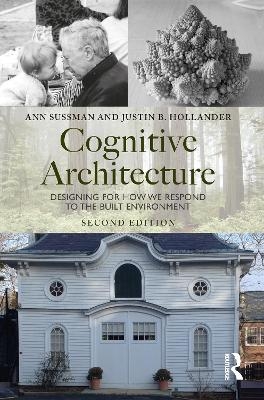
Cognitive Architecture
Routledge (Verlag)
978-0-367-46859-0 (ISBN)
- Titel z.Zt. nicht lieferbar
- Versandkostenfrei
- Auch auf Rechnung
- Artikel merken
The new edition includes:
Over 100 full color photographs and drawings to illustrate key concepts.
A new chapter on using biometrics to understand the human experience of place.
A conclusion describing how the book’s propositions reframe the history of modern architecture.
A compelling read for students, professionals, and the general public, Cognitive Architecture takes an inside-out approach to design, arguing that the more we understand human behavior, the better we can design and plan for it.
Ann Sussman is a registered architect, researcher, and college instructor. She co-edited (with Justin B. Hollander) the book Urban Experience and Design: Contemporary Perspectives on Improving the Public Realm. Keen on bridging the arts and science, she blogs at GeneticsofDesign.com. She currently teaches a new course on perception and the human experience of place, ‘Architecture & Cognition,’ at the Boston Architectural College (BAC). In 2020, she co-founded and became president of the nonprofit The Human Architecture + Planning Institute, Inc. (theHapi.org). Justin B. Hollander is Professor of Urban and Environmental Policy and Planning at Tufts University. His research and teaching is in the areas of physical planning, big data, shrinking cities, and the intersection between cognitive science and the design of cities. He is the author of six other books on urban planning and design and the co-editor (with Ann Sussman) of Urban Experience and Design: Contemporary Perspectives on Improving the Public Realm. He was recently inducted as a fellow of the American Institute of Certified Planners and hosts the Apple podcast ‘Cognitive Urbanism.’
1. A New Foundation: Darwin, Biology, and Cognitive Science; 2. Edges Matter: Thigmotaxis (the ‘Wall-hugging’ Trait); 3. Patterns Matter: Faces and Spaces; 4. Shapes Carry Weight: Bilateral Symmetry, (Hierarchy), Curves, and Complexity; 5. Storytelling Is Key: We’re Wired for Narrative; 6. Nature Is Our Context: Biophilia and Biophilic Design; 7. Buildings, Biology + Biometrics: Collecting Empirical Data for Evidence-Based Design; 8. The Twenty-First-Century Paradigm Shift in Biology and Psychology Reframes Architecture + Its History
| Erscheinungsdatum | 14.07.2021 |
|---|---|
| Zusatzinfo | 3 Tables, color; 138 Halftones, color; 138 Illustrations, color |
| Verlagsort | London |
| Sprache | englisch |
| Maße | 152 x 229 mm |
| Gewicht | 460 g |
| Themenwelt | Geisteswissenschaften ► Psychologie |
| Sozialwissenschaften ► Kommunikation / Medien ► Kommunikationswissenschaft | |
| Technik ► Architektur | |
| ISBN-10 | 0-367-46859-X / 036746859X |
| ISBN-13 | 978-0-367-46859-0 / 9780367468590 |
| Zustand | Neuware |
| Haben Sie eine Frage zum Produkt? |
aus dem Bereich


